
views
X
Trustworthy Source
Mayo Clinic
Educational website from one of the world's leading hospitals
Go to source
It's important to follow strict instructions about how to snack during the induction phase to get your diet off to a strong start. Snacking will help you fight fatigue, cravings, and overeating at mealtimes.
Atkins-Friendly Snack Foods
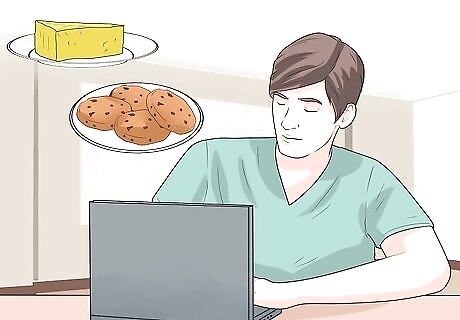
Go for snacks rich in fat, protein, and fiber. The first thing to do is to determine which foods are appropriate snacking material for the induction phase of the Atkins diet. This phase is all about drastically lowering the amount of carbohydrates you consume, so it goes without saying that you need to identify low-carb snacks. These snacks should be made of fat, protein, and fiber to best help you control your appetite between meals. You can find a large number of snack recipes online. Use search terms like “Atkins friendly snacks,” “Atkins diet snack recipes,” or “Low-carb snacks.”
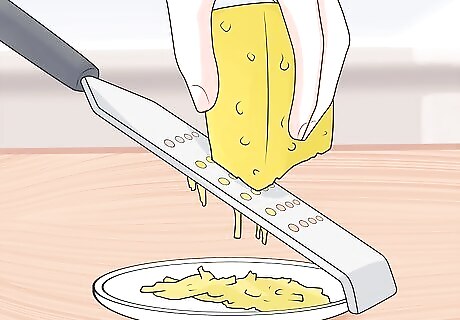
Eat cheese-based snacks for a filling, high-protein option. One of the attractions of the Atkins diet is that you don't have to cut out all fatty food, and still get to enjoy things like cheese (with the exception of cottage cheese and ricotta, which are higher in carbs than other cheeses). Cheese can be a good option for a small snack between meals that will limit your hunger and help you stick to the serving sizes for the main meals. An ounce of hard or string cheese is a great snack for the induction phase. Grate some mozzarella over 2 slices of tomato with a little basil for a nice snack. Wrapping some grated cheese in a lettuce leaf is nice alternative to just eating the cheese on its own.
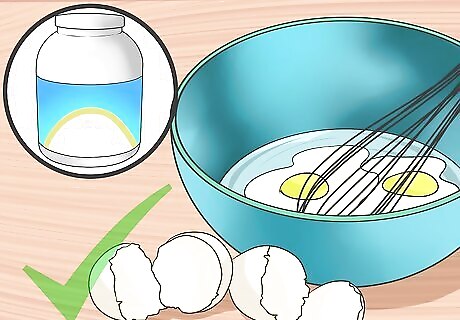
Snack on eggs for protein and healthy fats. Eggs are also a good choice for snacks while you are in the induction phase of the Atkins diet. They’re chock full of protein, vitamins, and healthy fats, and help you stay full longer between meals. You can prepare eggs scrambled, hard-boiled, or soft-boiled, or even make yourself a small omelet with non-starchy veggies (such as spinach or broccoli) and cheese. Try keeping a few hard-boiled eggs in your refrigerator for an easy snack between meals.
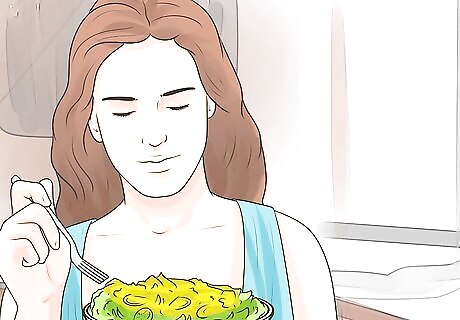
Eat vegetable-based snacks to get vitamins, fiber, and fat. Vegetables make good snack choices during the induction phase. Half an avocado is an excellent snack to put into your rotation. Alternatively, try an artichoke drizzled with a little lemon juice. A simple side salad with a boiled egg is also a fine choice for a low-carb snack. You can combine vegetables with cheese to make a delicious snack that is low in carbohydrates but will stop you from getting too hungry. For example, have a cup of sliced cucumber and 2 slices of cheddar cheese. You can also stuff 5 green or black olives with cheese, or have them on their own.
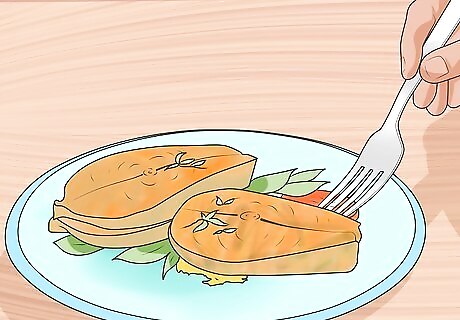
Opt for meat and fish-based snacks to get protein. There are lots of meat-based snack options for the induction phase. For example, roll some cooked sliced ham around a few raw or cooked greens to make a delicious ham roll-up. Or, switch the vegetables for cheese to make a cheese and ham version. Get 2 slices of ham and smear a tablespoon of cream cheese on each one. Roll it up for a great phase one snack! One fish option is to switch the ham for 3 ounces (85 g) of sliced smoked salmon. Smear the cheese onto the salmon. Roll the salmon and cheese up in a thin slice of cucumber. If you’re a vegetarian, swap out the meat for tofu. Or, dip some cucumber slices in hummus.
Preparation and Timing

Aim to snack in the morning and afternoon. In the induction phase of Atkins, you should eat 1 mid-morning and 1 mid-afternoon snack. You may not feel the need to snack if you have opted to eat 4 or 5 small meals during the day rather than 3 main meals. However, ensure that you don't go more than 4 to 6 hours during waking hours without eating anything. If you don’t feel like eating much, you can have a hot drink or broth as an alternative to a solid snack.

Prepare your snacks ahead of time if you’re on the go. Most of the snack options are quick and easy to prepare. For example, it doesn't take long to make a cheese and ham roll-up, or to hollow out an avocado. You may, however, need to prepare these snacks in the morning before you go to work or school. Always try to do this on the same day that you eat them, or the night before, so they are as fresh as possible. For some snack options, such as salads, you can prepare larger amounts and eat them over a couple of days to save time. Pickles (no sugar) are also a quick snack option. Having readily prepared snacks in the fridge, already set aside in the appropriate portions, will help to you control what you eat very closely and keep track of your consumption.
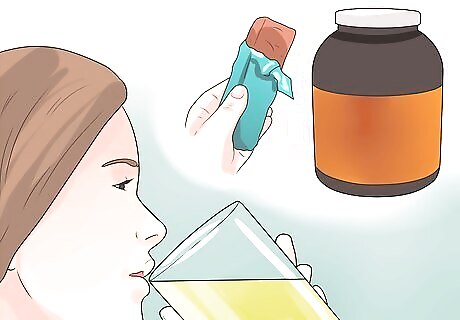
Stick to the program, even when you’re snacking. Snacking can often lead to problems with any diet, so it's particularly important that you monitor what you eat closely and stick to the program outlined. Try to vary your snacks so it doesn't become too repetitive and boring. Experiment with different combinations and different ingredients to broaden your horizons. There are some Atkins branded protein bars and shakes that are low in carbohydrates and make good snacks, but always check the label for the net carb content. Some bars are designed as snacks, others as meals. Don't become stuck on protein bars and shakes, try to keep as much balance in your diet as possible. Remind yourself that the induction phase is short-term, and that you will be adding in more variety in the next phase.

Keep up your water intake. It is especially important that you drink enough water in the induction phase of the diet. The Atkins diet has a strong diuretic effect, so you need to make sure you do not become dehydrated. Aim to drink 8 glasses of water a day. Each glass should contain 8 fluid ounces (240 mL) of water. If you don’t like the taste of plain water, add a splash of lemon or lime juice for extra flavor.
Success Strategies
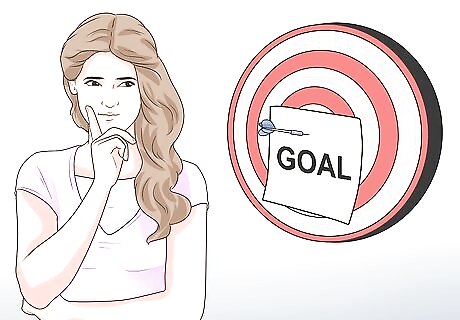
Plan out your goals. You should see this as the first step on your way to sustainable weight loss and a healthier lifestyle. Seeing the induction phase in your broader plan can motivate you stick with it through these first weeks. Having regular phases and regular goals can help you to maintain your commitment and support you in your long-term weight loss plan. Having attainable, specific, and plausible goals will be the most productive way to map out your progress. Couple your Atkins goals with some for specific amounts of regular exercise, such as 30 minutes of running twice a week.
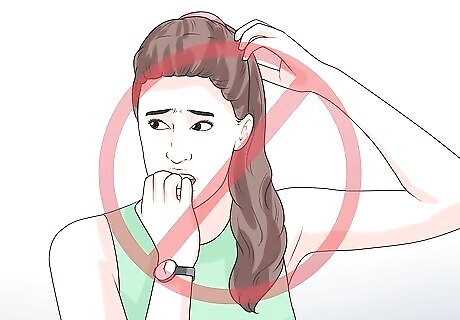
Don't obsess too much. Sticking to Atkins throughout the induction phase will require focus and commitment, but you don't want it to dominate your thoughts every waking minute. If you are constantly obsessing about net carbs, it could all become too overwhelming, or even disrupt other aspects of your life. Try to keep it to something you think about at meal times, and forget about it the rest of the time. Carrying on your life as normal while you are dieting will help you to stick to it and show that you can make dietary changes that are sustainable and not disruptive. This is hardest in the induction phase when the drop in carbs in most pronounced, so plan some activities with friends or work on hobbies to take your mind off it.

Maintain your overall health during the diet. If you don't look after yourself well during the induction phase, you could fall ill and end up coming off the diet prematurely. The most likely causes of feeling unwell are dehydration and an electrolyte imbalance. There are some things you can do to help you avoid these and stay as healthy as possible in the first weeks of Atkins. Drinking an 8 fl oz (240 mL) glass of water 8 times a day will keep you well hydrated and negate the effects of a loss in water weight in the induction phase. The loss of water weight can lead to light-headedness and a loss of energy. To ward these off, combine good hydration with consuming sufficient salt. Be sure to consume enough protein—typically, this is 3 servings a day of 4–6 ounces (110–170 g)—to maintain lean muscle mass.
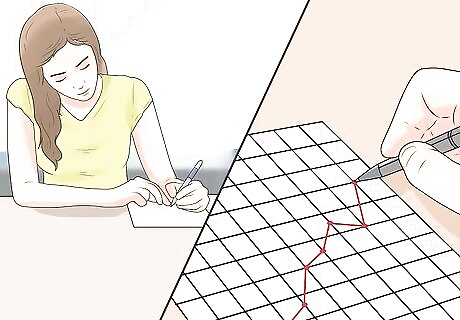
Measure your progress. One way to help you maintain motivation and stay on track during induction is to keep good records of your progress. Having a graph or chart that shows how far you have come will help push you forward in the following days. Plot out small milestones even in the induction phase to give yourself a trajectory to follow. Being consistent in your net carb intake is key in the induction phase, so devise a plan that takes this into account Try for level and steady progress rather than any peaks or troughs.

Reward your successes along the way. Once you complete the induction phase, take a moment to feel proud and reward yourself. This doesn't mean pigging out on chips—try to reward yourself with something that isn't food. For instance, you could buy yourself a little present, or go to a movie. Having frequent, smaller rewards as you meet your goals and progress through the Atkins program can be more effective than one big reward at the end. Small rewards will help you stay motivated and feel tangible benefits beyond just your weight loss. Instead of a material reward, you could give yourself an afternoon off from work or study to have fun.




















Comments
0 comment